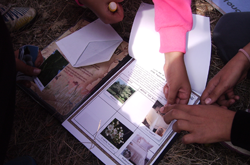This daylong program is based on a sequence of activities that give emphasis both on theoretical and practical aspects as well as on the aspects of the expression and evaluation. It is organized in such a way that supports the conceptual development of students on both environmental concepts and issues and at the same time, its design enables a smooth transition from the simple to the complex, from the familiar to the unfamiliar and from the easiest to the most difficult.
1. The plants in our lifes.
Students are gathered into a special screening room where they have the opportunity to watch an excellent eco-documentary entitled Akrotiri Peninsula – An Environmental Tour created by the CYCERE as an introduction to its programs.
Through an interactive discussion concepts related with the traditional uses of plants are highlighted and are discussed. In addition, the role and the functions of the plants are considered into the framework of the culture and the human societies. The emphasis of the program is focused on the collection and the treatment processes of the plants. The need for conservation through appropriate environmental management practices as well as the adoption of attitudes and behaviors friendly to the environment is also highlighted.
2. Study and discover.
Students study and discover the traditional uses of plants in Cyprus. Students are divided in groups and every group tries to achieve its own task through a well-designed game of hidden treasure. During the game students encounter riddles and surprises trying to collect the different elements needed for their task.
3. The need to preserve the traditional knowledge.
.Students are gathered into the ecology laboratory where they organize and analyze their data in order to create a presentation to the other groups. In addition, students explore the relationship between man and the uses of plants. Finally, students understand the need to preserve the traditional knowledge associated with plants and develop positive attitudes and values towards the environment.
4. Expression – Evaluation.
Students participate in artistic activities and in activities of creative expression. At this time, the program is also evaluated.
 Κυπριακό Κέντρο Περιβαλλοντικής Έρευνας & Εκπαίδευσης – Κυκπεε
Κυπριακό Κέντρο Περιβαλλοντικής Έρευνας & Εκπαίδευσης – Κυκπεε




